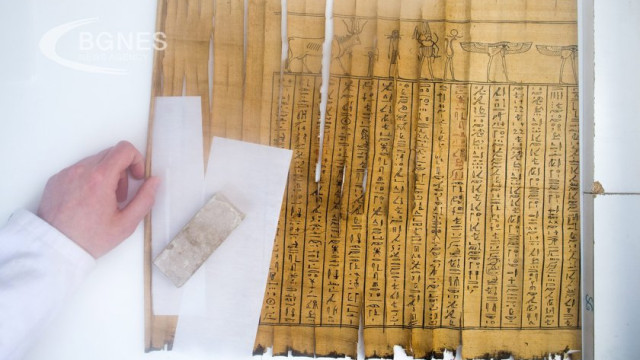Newly read passages from a papyrus scroll buried under layers of volcanic ash after Mount Vesuvius erupted in AD 79 may shed light on the final hours of Plato, a key figure in the history of Western philosophy.
As a result of the revolutionary discovery, it was found that the ancient scroll contained a previously unknown account describing how the Greek philosopher spent his last evening. The source described how he listened to music played on a flute by a Thracian slave girl, the Guardian reported.
Although struggling with a fever and near death, Plato - known as a student of Socrates and mentor of Aristotle - died in Athens around 348 BC. - has maintained enough clarity to criticize the musician for her lack of rhythm, the narrative indicates.
The deciphered words also suggest that Plato's burial site was in the garden at the Academy of Athens, the world's first university founded by him, adjacent to the Museion. Before that, it was only generally known that he was buried within the academy.
During the presentation of the research results at the National Library of Naples, Professor Graziano Ranocchia of the University of Pisa, who led the team responsible for the discovery of the carbonized scroll, described the discovery as "an exceptional result that enriches our understanding of ancient history".
"Thanks to state-of-the-art imaging techniques, we are finally able to read and decipher new parts of texts that until now seemed inaccessible," Ranocchia said.
The text also reveals that Plato was sold into slavery on the island of Aegina, possibly as early as 404 BC, when the Spartans conquered the island, or else in 399 BC, shortly after Socrates' death.
“Plato was previously believed to have been sold into slavery in 387 BC. during his stay in Sicily at the court of Dionysius I of Syracuse. "For the first time, we have been able to read a series of hidden letters from the papyri, which were wrapped in multiple layers glued together over the centuries, through a process of unfolding using a mechanical technique that disrupts entire fragments of the text," Ranocchia claims.
He stated that the ability to identify these layers and practically rearrange them in their original positions to restore textual continuity represents a significant advance in the collection of vast amounts of information.
The professor said the work was still in its infancy and that its full impact would only be seen in the coming years.
The scroll was kept in a sumptuous villa in Herculaneum and was discovered in 1750. It is believed to have belonged to Julius Caesar's father-in-law.
Over the years, scholars have tried to decipher the scrolls found in this villa, known as the Villa of the Papyri.
Domenico Camardo, an archaeologist with the Herculaneum Conservation Project, compared the impact of the 79 AD eruption. on Herculaneum, an ancient Roman coastal city near Pompeii, with the dropping of an atomic bomb on the Japanese city of Hiroshima during World War II.
The pyroclastic wave triggered by Vesuvius was so hot - the temperature is believed to have been between 400 and 500 degrees - that the victims' brains and blood instantly boiled./BGNES







